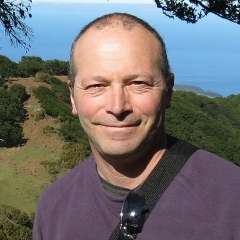In the Best of All Possible Worlds, Oper Köln wouldn’t still be performing in temporary rented accommodation several years after its new theatre should have been completed. And in the Best of All Possible Worlds, Bernstein’s ‘comic operetta’ Candide should be able to be performed without microphone assistance. But such are the realities of life. Choreographer Adam Cooper’s staging, a co-production with Munich’s Staatstheater am Gärtnerplatz, where it was first seen a year ago, has been shoehorned into one of the low-ceilinged exhibition spaces of Cologne’s Staatenhaus, which entails the Gürzenich Orchestra and conductor Benjamin Schwarz being hidden from view behind the performance area.
Therein lies the major problem here: it has been deemed necessary to mike up the players as well as the singers, with the result that the orchestra comes across as a very unsubtle wall of badly balanced sound, coarse, bass-heavy and giving the impression of a mono rather than stereo – let alone surround-sound – experience. At its worst it shows up any untidiness in the playing, and there were enough such instances to make it hard to believe that this was the same orchestra that played Ravel so sublimely in this same building only a couple of months earlier.
Cooper’s production itself is colourful, sleek and witty, if not delving beyond the surface romp to explore the circumstances of the piece’s roots in the McCarthyite USA, where Bernstein and his collaborators (many came and went along the way) saw new resonance in Voltaire’s satire on the philosophy of optimism. Rainer Sinell’s open-plan design makes for a straightforward performance area, overlooked by a huge historic map of the world, where the stages of Candide’s picaresque journey are helpfully pinpointed as they progress. The English lyrics to the musical numbers have been kept, but the dialogue and narration have been rendered into German – not as disconcerting as might have been predicted, and understandable when faced with the task finding a German rhyme for the Old Lady’s birthplace Rovno Gubernia to match the English ‘hernia’…
In the end, though, this is an evening that succeeds through its singers. Their miking was a little better managed than the orchestra, but there were still strange locational discrepancies between eye and ear, and one felt most of the singers could have projected well enough without their help, even it assisted with the dialogue. One exception, one felt, may have been the Voltaire / Pangloss / Cacambo / Martin of Alexander Franzen, a musicals specialist with the rough-hewn, unsubtle voice that goes with the territory. His stage presence was impressive enough, but his sung numbers seemed to sit uncomfortably on his vocal range, and in his Act II ‘Dear Boy’ he fell back too obviously on the mannerisms of Adolph Green’s memorable assumption of the part on Bernstein’s own classic recording.
The rest of the cast, though, could hardly be bettered. Gideon Poppe, making his Oper Köln debut in the title role, is a very fine lyric tenor, with a lovely legato and a masterly sense of phrasing. Emily Hindrichs, a familiar Queen of Night on the Magic Flute circuit, was a truly classy Cunegonde, bringing to her numbers exceptional diction (not always easy in high tessitura), tonal evenness and great musicality, most winningly in ‘Glitter and Be Gay’. Dalia Schaechter was a spirited and vocally commanding Old Lady, John Heuzenroeder an eloquent Governor (along with half a dozen other cameo roles) and Wolfgang Stefan Schwaiger stole his scenes as the self-regarding Maximilian. The rest of the cast were largely drawn from the chorus, which seemed a little lax in stage discipline but sang with unanimity and focus.




